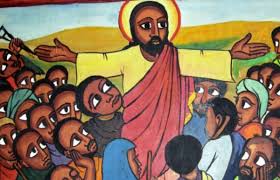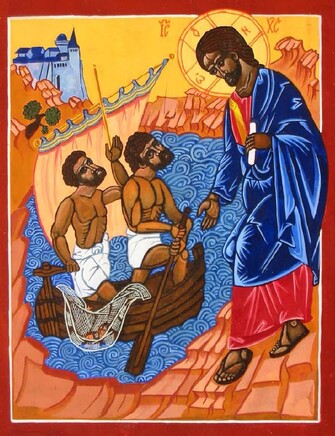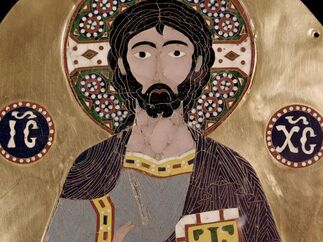
Gen. 45: 3-11, 15; Luke 6:17-38
This week’s gospel lesson continues Jesus’ teachings and continues a pattern of great reversal – last week we heard how the hungry will be filled and those who are full will become hungry. Today Jesus flips another commonly held belief that one should ‘Love your neighbor’ and hate your enemy – which actually is not in the bible. Jesus is challenging a deeply entrenched oral tradition that considers social outsiders and foreigners as enemies. Jesus declares: “Love your enemies, do good to those who hate you, bless those who curse you and pray for those who abuse you.”
So, do you know of any enemies? Is there anyone in your life at some time that disliked you so intensely that they would be happy to see you stumble a little, or fail, or even actively tried to make this happen? Someone who has hurt you profoundly? Is there someone who opposes you vehemently and wants you to be proven wrong? Is there an adversary that promotes gossip, negativity about you? Or let’s flip the coin: have you ever been an enemy, an opponent, and adversary to somebody? Have you ever hurt someone to the point of estrangement? Chances are at some time in our lives we have treated someone with such contempt, anger or opposition that we would qualify as an enemy, an adversary, an opponent. Let’s take a closer look at the enemy territory.
Enemies are around us and they are everywhere in the bible. In the very beginning in the garden of Eden, the serpent has clearly indicated himself as an enemy to humanity and to God as it successfully gets Adam and Eve to sin and fall away from God’s grace. So, Satan is not only the number one opponent to God’s will but to us as well as 1 Peter 5:8 warns: “Be alert and of sober mind. Your enemy the devil prowls around like a roaring lion looking for someone to devour.” In our Hebrew lesson, Joseph and his brothers were estranged. Jealous of the favoritism shown to Joseph by their father, they sold Joseph into slavery and faked his death. 22 years later, Joseph is reunited with his brothers. Joseph ends the conflict by forgiving them. Next, Egypt, by enslaving the Hebrew people, was an enemy. Israel’s neighbors were constant enemies, engaging in ongoing warfare for land and resources. King Saul became an enemy to David, seeking to kill him. Paul was first an enemy of the church until his conversion. Scriptures teaches that the very Spirit of the world has set itself in opposition to the word of God. Finally, we are often our own worst enemy, often engaging in behaviors that mare our spirit or our body. The apostle Paul puts it this way: “I do not understand what I do. For what I want to do I do not do, but what I hate I do. And if I do what I do not want to do.” (Romans 7:15). To all this Jesus says: Love your enemies, do good to those who hate you. Pray. Bless.
The spirit of enmity is strong all around us and within us since the dawn of time. Families fight. Communities fight. Nations war against each other, committing genocide and enslaving one another. The twentieth century has been called the “century of genocide”: two world wars, the Jewish holocaust, the Armenian holocaust, forced starvation in the Soviet Union, the millions of lives lost in the Great Leap Forward in Communist China, countless death in Namibia, Rwanda, Nanking, Bangladesh, Serbia, Cambodia, Latin America – the list stretches on to so many places, so much hate, so much destruction, so much death. Yet Jesus says to us: Love your enemies. do good to those who hate you.
The arrival of modern media in all its forms as fanned the flames of hate. In 1915 D.W. Griffith produced “The Birth of a Nation” one of the most financially and popular films of its days, it put cinema on the map. The birth of a Nation, however, reinforced racism by depicting African Americans as Lazy, stupid and dangerous, while glorifying the Ku Klux Klan. Inspired by this success, the Nazis produced “Jud Suss” a film portraying Jews as greedy and treacherous and was required viewing by Nazi stormtroopers. Al Qaeda exploited the internet online chat rooms and blogs to promote its agenda of Anti-Israel and anti-American Anti-west sentiments. Social media with its ability to provide immediate, widespread impact, is used to deliberately promotes discord and hatred and bullying; truth, compassion forbearance and tolerance have become casualties in this never-ending war. To all this Jesus says: Love. Go Good. Bless Pray.
Jesus clearly saw the hatred, persecution, and division around him. Jesus knew the centuries of bloodshed and bad blood between Israel and its neighbors, Jesus was aware of his surroundings: Jews hating Samaritans and the current oppressor of the day, the Romans. Samaritans despising Jews. Jews prejudiced against gentiles. Pharisees and Sadducees opponents to each other Everyone looked down upon tax collectors and the poor. Anyone disabled was considered a sinner and out of favor with God. Into this this raging soup of conflict, distrust and ethnic hatred, Jesus declares: Love your enemies. Do good to those who hate you. Pray for those who persecute you. Bless those who curse you.
It would have been so easy for Jesus to toe the party line. But he didn’t. Jesus instead insisted that his disciples follow the principle of love. The word for love Jesus uses is important: Jesus doesn’t use the word for kinship love, sibling love (phileos) but instead he uses the word agape, meaning unconditional love, redemptive love, love rooted in the divine. We don’t have to like our enemies or what they do to us. But we are commanded to love them, as God loves them, we have to stop wanting their downfall, seeking out bad things to happen to them; we have to stop putting them down, planting lies, plotting the worst. Jesus uses action verbs: love, do good, bless and pray. Jesus sums it up by saying “do unto others as you would have them do to you.” Let’s want for others what we want for ourselves. Not just those whom you love. But those whom you hate, despise, hold in contempt. That’s what makes the difference, Jesus says between sinners and disciples. We are called to be disciples to help radically transform a world mindset that perpetually seeks a win-lose scenario in every area of our lives and in the world. Jesus says stop! Stop this madness! Only agape love seeks a win-win scenario – all are redeemed by the God who makes the sunshine on the sinner and saint alike.
Dr. Martin Luther King Jr, preached at the beginning of the civil rights movement in 1957 a powerful sermon entitled “Loving Your Enemies.” King contends that in the best of us there is some evil; and in the worst of us there is some good. Therefore, there are three choices to respond to oppression: 1. respond
violently with corroding hatred and end up as bad or worse off as your oppressor. 2. To submit to the oppression – which he considered just as wrong: noncooperation with evil is just as much a moral obligation as cooperation with the good. 3. Finally, King tells us massive nonviolent resistance rooted in love is the only answer. Like what Jesus said. Love. Do good. Bless. Pray.
You see, hate and love operate in similar ways. Hates distorts the hater. Hating is a poison, according to Buddha, a live coal we intend to aim at someone else but that burns our own hands. Love, on the other hand, heals and betters the one who loves. Agape Love is the antidote, the spirit of transformation that can demolish divisions, create bridges and heal wounds. King knew, Jesus knew, what the scientists have been telling us for ages: hating and loving changes our brain chemistry, for worse or for better. With hate, the brain becomes obsessive, fixated, ruminating, paranoid, anxiety, anger or depression deepen. Nothing good comes from hate. Hate will bring us down quicker than any plot we devise toward an adversary. So, if just for sake of mental health: love your enemies. Pray for your persecutors.
We need to acknowledge that some of us have been hurt so deeply, wounded so profoundly, that loving, doing good, blessing and praying for whoever has hurt us is an insurmountable obstacle. In moments like this we remember that what is impossible for us is not impossible for God. Leave the hate, hurt and anger in God’s hands. Vengeance is mine, says the Lord. Let go, Let God handle it in his time, and let us be freed from the destructive power of hate and its constellation of negative emotions.
There is an eraser for everyone today as you entered the sanctuary. Take a moment with that eraser in your hand. Imagine a hurt whatever is festering deep in your heart. Start with something small but start somewhere. Ask God to erase the hate, the malcontent, the incident in your life that a bad spirit has you fixated upon, and let God erase it for you. Let God carry that burden for you. For we are not made to carry burdens of hate but of love. Begin today. start small. Give over to God a person, some entity, some movement, some idea that holds you imprisoned in your mind. May the mercy of God fill us and so heal us that we can become carriers of this mercy to a love-starved, world. In doing so, we act as Dr. King says, we make of this old world a new world, a new world governed by love. So let us remember. Love, do good. Bless and pray.
https://kinginstitute.stanford.edu/king-papers/documents/loving-your-enemies-sermon-delivered-dexter-avenue-baptist-church



 RSS Feed
RSS Feed